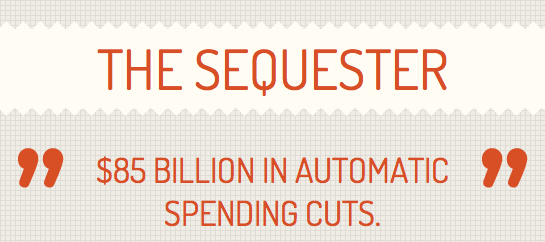The Sequester Hits Home

Very few doubt that the American government has a spending problem. With its current budget deficit over one trillion dollars, Washington has struggled to find effective and bipartisan ways to cut back on how taxpayer money is spent, however, many taxpayers believe the political games played by their elective representatives are truly hurting America. This became more apparent in Congresses failure to reach a deal to avoid the “Sequester”, a legal procedure that limits the size of the federal budget and sets a cap of how much the government can spend. These automatic cuts hurt people all over the nation, and those here in Nebraska are no different.
When sequestration kicks in, government departments and programs are all hit with a budget cut that is the same across the board.
This is not the first time budget sequestration has been threatened. In 1985 the term was used in order introduce hard caps on government spending. Those hard caps, however, were replaced with what was called PAYGO, a budget practice that allows for new spending or tax changes without increasing the deficit by offsetting those changes with existing funds. PAYGO, as it existed within the original 1985 bill, expired in 2002.
In 2011, during the debt-ceiling crisis, sequestration was added into the Budget Control Act of 2011 with the hope of forcing Congress to work together to pass deficit reduction legislation. The plan was made to appear so awful that no one in Washington would actually allow it to happen, but, as things usually happen in Washington, Congress waited until the last minute to resolve the problem. However, unlike deadlines of the past dealing with other issues, Congress failed to pass any legislation to avoid the self-inflicted sequestration.
As of March 1, 2013, $85 billion in automatic budget cuts will go into effect. The cuts largely effect discretionary spending, or spending that could be adjusted on a yearly basis and is not attached to a particular law. Additionally, the cuts must happen within seven months. As the cuts are across the board, individual agencies have little to no discretion about the impact or scope of the cuts.
Now, with billions being cut from the federal budget, the impact will be felt by almost every citizen. That impact, however, may not be felt right away or be as severe as the forecast holds. Remember, the cuts happen over months, so if Congress acts to stop or slow down the cuts, the impact will be less than expected. If not, the prediction is that economic growth will slow down by .6%, severely threatening public jobs and services numerous people rely on.
The prognosis for the nation is gloomy and Nebraska will also feel the pain from the harmful cuts. To begin, public safety is in jeopardy as the local military and law enforcement will feel the effects. Army base operations funding could be cut by $1.1 million dollars, while the Air Force base operations could lose about $15 million in funding. Nebraska will lose about $97,000 in Justice Assistance Grants that help support different types of public safety agencies such as local law enforcement, prosecution, and crime prevention departments.
Those trying to find work will find it even harder as Nebraska will lose $460,000 in job search assistance and training, meaning that up to 14,440 people will not have the help they need to find employment.
Public health for everyone from children to seniors will also be affected as $121,000 will be lost which would normally be available help provide meals for seniors. Nebraska’s ability to prepare and respond to health threats such as diseases and natural disasters will dwindle by $174,000. Another $390,000 will be lost from grants that help Nebraska fight against substance abuse, ultimately ending in about 1,300 fewer people admitted into to substance abuse programs and centers. Nebraska’s Health and Human Services will not be able to serve people with serious health problems, such as HIV, as they will lose about $51,000 in funding. In addition $39,000 in funds will be cut that is usually available to help victims of domestic violence, their could eventually lead to up to 100 fewer victims being saved.
Vaccines for children will also be affected, as about 760 fewer children will receive essential vaccines to help prevent diseases such as measles, influenza, and Hepatitis B. To make the problem worse, up to 200 children could lose their access to childcare. Even the air and water will be effected as Nebraska lose over a million dollars in environmental funding that would normally be available to help keep the water and air clean for all people. Nebraska will also not be as well equipped to fight pollution and waste that could harm natural lands including popular hunting and fishing lands as it will lose an additional $686,000 in grants for protection of these natural environments.
Perhaps the worst of the sequester strikes American schools and teachers. Head Start and other early education programs will close their doors to about 400 Nebraska children. About 180 low-income students will be without essential aid to help finance the cost of college and 150 fewer students will be able to attain work-study jobs that also help them shoulder the cost of college. Nebraska public schools will lose almost $3 million that would traditionally help fund primary and secondary education programs. This cut puts the jobs of over 40 teachers and their aides at risk. Also lost will be $3.5 million earmarked to provide education for children with a disability, which also puts more jobs at risk and puts crucial education out of reach for numerous children.
Nobody in Washington wants to see these cuts happen, but with the gridlock that persists, the cuts are all but inevitable. Jobs will be lost, education will be cut, and public health initiatives for America’s children and elderly will be at risk, threatening to send the nation further back in its climb to regaining a strong economic footing. The threats are real and everyone will see the effects and suffer the consequences that come as a result of this sequester. The cuts Nebraska faces are serious and they are many. These cuts aren’t simply dollar signs and statistics, but rather they are the numbers behind the people who can’t get help and who will feel the worst of the budget cuts. President Obama puts it simply, “It’s unnecessary, at a time when too many Americans are still looking for work, it’s inexcusable.”





